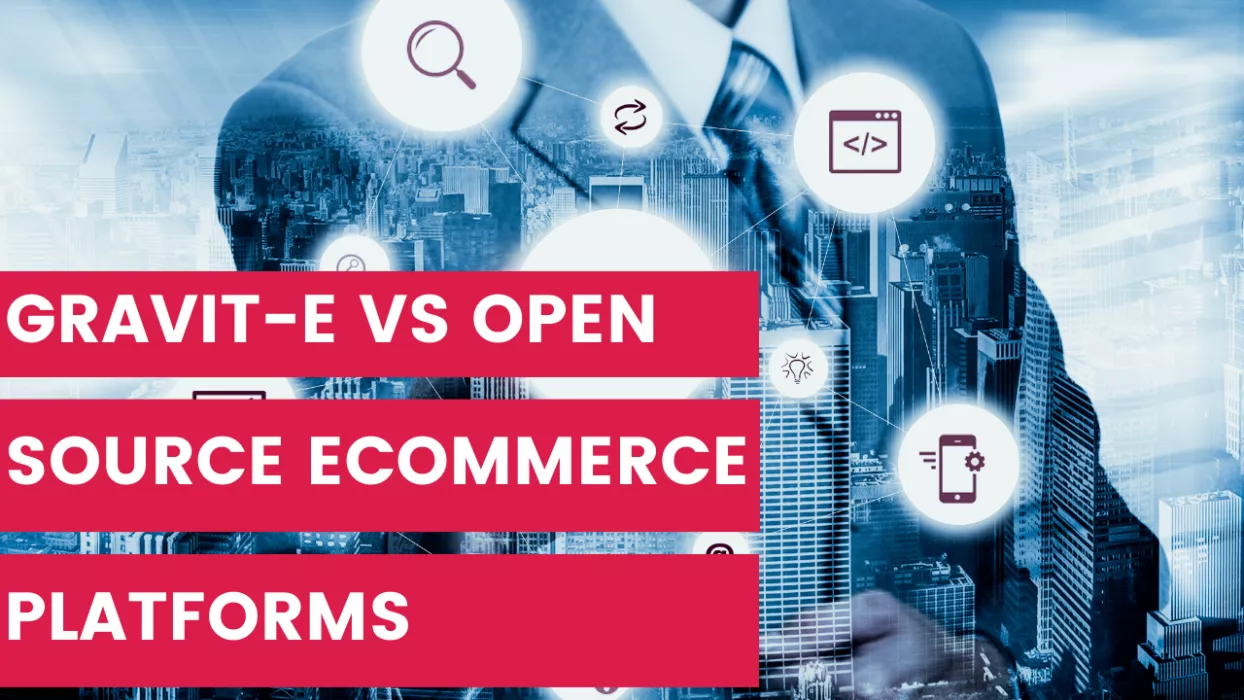Gravit-e vs Open Source eCommerce. Why Gravit-e may be the better choice

The Digital Commerce realm is bustling with a myriad of Content Management System (CMS) options. While open-source platforms like WordPress, Drupal, and OpenCart have garnered substantial attention, when it boils down to delivering tailor-made eCommerce solutions, the closed-source Gravit-e: Total eCommerce platform clearly takes the lead. Here are compelling reasons why Gravit-e could be the better choice for your B2C and B2B eCommerce website(s).
Purpose-Built Architecture
Unlike its open-source counterparts, Gravit-e has been built and developed over 10 years from the ground up specifically for B2C and B2B eCommerce. While platforms like WordPress, Drupal, and OpenCart require a medley of plugins or extensions to morph into eCommerce platforms, Gravit-e’s core architecture is meticulously engineered to cater to the distinct requirements of online selling, right out of the box.
Security Fortification
In the eCommerce arena, safeguarding transactional data is paramount. Gravit-e’s closed-source nature allows for a dedicated team to oversee its codebase integrity, thus fortifying its defense against potential cyber threats. On the flip side, the open-source platforms' dependency on third-party plugins for eCommerce functionalities can, unfortunately, serve as a breeding ground for security vulnerabilities.
Stability and Reliability
The dependency on third-party plugins in open-source CMSs can occasionally trigger conflicts either among plugins or with the core code, potentially leading to stability issues. Gravit-e’s cohesive design significantly mitigates such risks, offering a more stable and reliable infrastructure for your online storefront.
Centralised Maintenance
The maintenance of open-source platforms can sometimes feel like navigating through a fragmented landscape, especially with numerous plugins often getting abandoned by developers over time. Gravit-e, with its centralised maintenance by a dedicated team, ensures consistent updates and support, thus significantly reducing the maintenance burden on business owners. Gravit-e also implement a rolling maintenance schedule, meaning fixes and enhancements are included for all customers.
Cost Efficiency
The initial allure of cost-effectiveness with open-source platforms can be overshadowed by the cumulative cost of purchasing multiple plugins and potentially dealing with security or stability issues. While Gravit-e may entail a higher upfront investment, it often leads to a lower total cost of ownership given its comprehensive eCommerce functionality provided from the get-go.
Enhanced Performance
Gravit-e’s focused eCommerce functionality often translates to better site performance, be it in page load times or transaction processing. Open-source platforms, when stretched to fit the eCommerce mold, may not always deliver the same level of performance efficiency.
A Final Word on B2C vs B2B
The paths of B2C (Business to Consumer) and B2B (Business to Business) sales often diverge, each presenting its own set of challenges.
A seamless shopping experience with easy navigation, clear pricing, and straightforward tax calculations is paramount to B2B. Transactions are straightforward - purchases made at a set price plus tax, whereupon the transaction concludes. Many Open Source platforms can handle this with ease.
On the contrary, B2B transactions are anything but straightforward. They involve multiple stakeholders with negotiated price lists, discounts, and often, tax rates; sophisticated inventory management systems that track stock across multiple warehouses; pricing matrices influenced by bulk purchases, long-term contracts, and the fluctuating costs of materials. They require a level of customisation and personalisation that B2C transactions do not and robust CRM (Customer Relationship Management) systems to nurture relationships and manage contracts.
In essence, while B2C eCommerce thrives on simplicity and speed, B2B eCommerce is a game of precision and personalisation, each demanding a unique set of features and functionalities from the CMS platforms powering them. This fundamental difference underscores why a purpose-built solution like Gravit-e, designed with the intricate demands of B2B (and B2C) eCommerce in mind, often stands out when pitted against more generic, one-size-fits-all platforms.
If you need help exploring why Gravit-e may be the best CMS for your eCommerce needs, Email us now at info@gravit-e.co.uk or call us on 02920 007 111.